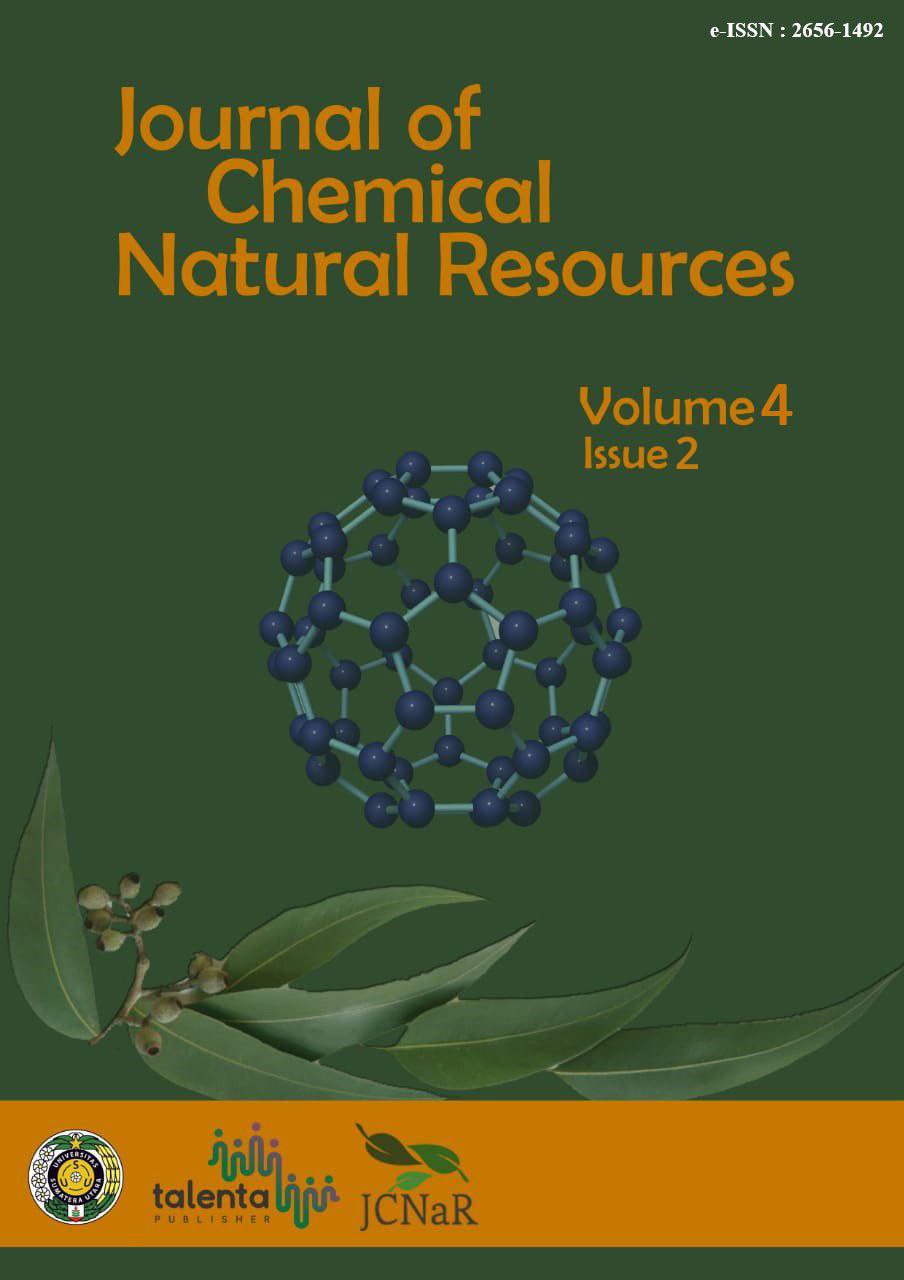Manufacture and Use of Mesoporous Magnesium Silicate for Increasing Vitamin E Concentrate from Candlenut Oil
DOI:
https://doi.org/10.32734/jcnar.v4i2.11965Keywords:
Adsorbent, Adsorption, Magnesium Silicate, Vitamin EAbstract
Magnesium silicate 75, magnesium silicate 90, and magnesium silicate MgO have been synthesized to increase the concentration of vitamin E from candlenut oil. The reaction of MgO and SiO2 synthesizes the adsorbent magnesium silicate—X H2O by hydrothermal method. The magnesium silicate obtained was characterized by BET, showing the pore size of the three different types of adsorbents, namely magnesium silicate 75 (6.118 nm), magnesium silicate 90 (6.248 nm), and magnesium silicate MgO (3.2238 nm). The adsorbent is used to increase the concentration of vitamin E in candlenut oil. Pecan oil is dissolved with n-hexane in a ratio of 1: 1 in a column containing the adsorbent. After the n-hexane descends from the column tool, vacuum to remove the solvent. Then the results are collected into vials. Then vitamin E levels wer measured by HPLC using standard Tocopherol and tocotrienol. The results of the HPLC test obtained a comparison of the three types of adsorbents' ability to increase levels of vitamin E from candlenut oil, where the adsorbent of magnesium silicate MgO can only increase vitamin E levels which were 429 ppm to 248.72 ppm (0.57 times enriched). In contrast, the magnesium silicate adsorbents 75 and 90 can increase vitamin E levels from 429 ppm to 733.73 ppm (1. 71 times improved) and 855.97 ppm (1.99 times enriched).
Downloads
References
Alkatiri S, 1996. Brief Study of Biology. Print I. Surabaya. Airlangga University Press
Buhari, 2016. Modification of Silica as an Absorbent for Heavy Metals. Nanoscience
Bird T, 1993. Physical Chemistry for Universities. Jakarta : PT Gramedia Pustaka Utama.
Bintang M, 2010. Research Engineering Biochemistry. Erlangga Publisher, Jakarta
Brown ME and Gallaher PK, 2003. Thermal Analysis and Calorimetry. Comparison Of Selected Adsorbents For Adsorption and Desorption of Vitamin E From Palm Fatty Acid Distillate. Elsevier. Ottawa. Volume 2
Chu BS, Baharin BS, CheMan YB, Quek SY, 2004. Comparison Of Selected Adsorbents For Adsorption And Desorption Of Vitamin E From Palm Fatty Acid Distillate. Department of Food Technology. Department of Food Science Faculty of Food Science and Technology University Putra Malaysia 43400 UPM Serdang Selangor DE, Malaysia.
Cullity BD, 1978. Elements of X-Ray Diffraction. Second edition. Addison-Wesley publishing company inc. Canada
Eva MG, Nurdin B, 2014. Characterization of Materia. UNIMED Press: Research Institute Building Floor 1
Gates BC, 1992. Catalytic Chemistry, John Wiley and Sons Inc, Singapore: 259-276
Ghods B, Rezaei M, Meshkani F. 2016. Synthesis of Nanostructured Magnesium Silicate with High Surface Area and Mesoporous Structure. Iran. Elsevier Ltd and Techna Group
Huang R, Wu M, Zhang T, Li D, Tang P, Feng Y. 2017. Templates free Synthesis Of Large-Pore-Size Porous Magnesium Silicate
Hierarchical Nanostructures for High-Efficiency Removal of Heavy Metal Ions. China. ACS Publications
Iswari RE, Yuniastuti A. 2006. Biochemistry. First Edition. Yogyakarta. Science House
Johnson CK, 1971. A Fortran thermal-ellipsoid plot program for crystal structure illustrations. Oak Ridge National Laboratory Report ORNL-3794, second revision
Kanellopoulos N, 2011. Nanoporous Materials: Advanced Techniques for Characterization, Modeling, and Processing. CRC Press Taylor & Francis Group. New York.
Ketaren S, 2005. Food Oil and Fat. Jakarta. UIPress
Kristanti H, 2010. Diseases Due to Excess and Deficiency of Vitamin Minerals and Electrolytes. Printing 1. Yogyakarta. Library image.
Marita LL, 2014. The Role of Calcium in Adsorbents of Calcium Polystyrene Sulfonate and Calcium Stearate on the Adsorption and Desorption of Tocopherols and Tocotrienols from a Mixture of Candlenut Oil Methyl Esters, Thesis, Medan, Department of Chemistry, Faculty of Mathematics and Natural Sciences, University of North Sumatra, USU.
Paimin FR, 1997. Candlenut Cultivation and Business Prospects. Jakarta. Self-subsistent
Poedjiadi A, 2007. Fundamentals of Biochemistry. The University of Indonesia Publisher
Rashid I, Daraghmeh NH, Al Omari MM, Chowdhry BZ, Leharne SA, Hodali HA, Badwan AA, 2011. Provided for Non-Commercial Research and Educational Use Only. Not For Reproduction, Distribution, Or Commercial Use. Burlington. Elsevier Inc. Academic Press
Ramadhan P, 2015. Getting to Know Antioxidants. Science House
Rauf R, 2015. Food Chemistry. Publisher Andi. Yogyakarta
Rouque-Malherbe RMA, 2007. Adsorption and Diffusion in Nanoporous Materials. CRC Press Taylor & Francis Group.
Sayuti K, 2015. Natural and Synthetic Antioxidants. Andalas University Press, Padang
Sebayang F, Kaban J, Bangun N, Bulan R, Nabila K, 2016. Enrichment of Tocopherol and Tocotrienol using Polar Adsorbents from Candlenut Oil. Int'l Journal of Advances in Chemical Engg., & Biological Sciences (IJACEBS), 3 :1
Schubert U, Husing N, 2006. Synthesis of Inorganic Materials, Second Edition. Wiley-VCH Verlag GmbH & Co, KGoA, Weinheim.
Sunanto H, 1994. Cultivation of Candlenut Export Commodities. Yogyakarta. Publisher Canisius
Taspinar OO, Yucel SO, 2008. Lipid Adsorption Capacities of Magnesium Silicate and Activated Carbon Prepared From the Same Rice Hull. The Chemical Engineering Department, Istanbul Technical University, Masiak/Istambul, turkey.
Yazid E, Nursanti L. 2006. Guide to Biochemistry Practicum for Students Analyst. Yogyakarta. Publisher Andi
Zhao C, Yang J, Jiang B, 2017. Rational Design of Hierarchical Macroporous Mesoporous Magnesium Silicate for Highly Efficient Removal of Organic Dye and Pb2+. RSC Advances: 47225.
Zhang J, Dang L, Zhang M, Qingshan L, Shifeng Z, 2017. Characterization of Mesoporous Magnesium Silicate With Hierarchical Structure and its Adsorption Performance for Dye and Lead Ion. School of Physical Science and Technology, Inner Mongolia Key Lab of Nanoscience and Nanotechnology, Inner Mongolia University, Hohhot, China: 112
Zhang J, Qiang L, Qiangshan L, Jhinhua L, Jingfeng L, Chenhao D, Qingmei Z, 2016. Hydrothermal Synthesis and Characterization of Ordered Mesoporous Magnesium Silicate- Silica for Dyes Adsorption. School of Physical Science and Technology, Inner Mongolia Key Lab of Nanoscience and Nanotechnology, Inner Mongolia University, Hohhot, China: 16

Downloads
Published
Issue
Section
License
Copyright (c) 2023 Journal of Chemical Natural Resources

This work is licensed under a Creative Commons Attribution-ShareAlike 4.0 International License.














